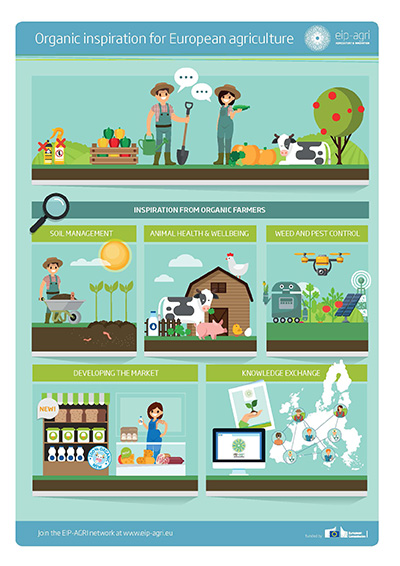European agriculture faces increasing restrictions on the use of external production inputs, such as artificial fertilisers, pesticides and antibiotics. Organic farmers have experience in dealing with these issues, which is why organic farming may open new avenues for soil management strategies, weed and pest control, and livestock health and wellbeing, for other organic farmers and conventional farmers. The organic sector has a tradition of close collaboration between farmers and researchers, with farmers and on-farm testing at the heart of this collaboration. This brochure offers some examples of potential solutions inspired by organic farming. It also highlights the importance of collaboration and of exchanging knowledge between farmers, researchers, advisers and others, through Operational Groups but also in broader (European) networks.
This brochure has been produced within the framework of the European Innovation Partnership for Agricultural Productivity and Sustainability (EIP-AGRI), which was launched by the European Commission to promote innovation in the agricultural and forestry sectors and to better connect research and practice.
The EIP-AGRI Workshop ‘Organic is Operational’ (Hamburg, June 2017) brought together partners in Operational Groups working in organic farming or closely related subjects across Europe. The event offered opportunities for networking and addressed challenges related to soil management, organic arable farming, organic horticulture, pasture and grassland management, various livestock species as well as business models and accessing the market.
This brochure follows up on the workshop’s final report, and the booklet that was created for the event, which includes details on Operational Groups that were represented at the workshop. All workshop results can be found online via www.eip-agri.eu.
Read Susanne Padel’s report on the ‘Organic is Operational’ workshop in Hamburg, June 2017 from ORC Bulletin 123 here

